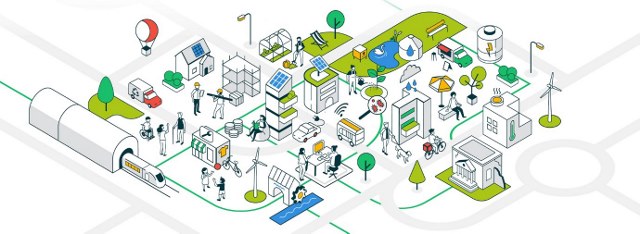
Themagroep ‘Energie in Ekkergem’ heeft een projectvoorstel ingediend voor de Urban Doers Grant. Deze subsidie omvat geldelijke steun en de toegang tot trainingen en coaching om ‘urban doers’ zoals onze themagroep te helpen bij het ontwikkelen van hun ideeën en het bouwen van netwerken. Wijkregisseur Evelyne Deceur wees ons op deze subsidiemogelijkheid, waarvoor dank. Deze subsidie zou de themagroep toelaten om onze kennis en impact te vergroten.
Hieronder lees je ons projectvoorstel, geformuleerd als een antwoord op drie opgegeven vragen. Rond 15 augustus 2023 zal de jury bekendmaken of ons projectvoorstel is geselecteerd. Voor meer informatie over het EU initiatief Driving Urban Transitions to a sustainable future, zie https://dutpartnership.eu/.

Tell us about your activities to contribute to urban transformation. Please answer the following questions to present your organisation / initiative / project.
Q1: How does your organisation / initiative / project contribute to urban transformation?
Buurtcomité Ekkergem is an open association of citizens living in the district of Ekkergem in Ghent (Belgium). For decades we have been keen on advancing the cohesion and inclusion in our neighbourhood through festivities, urban actions and more recently through the collective greening of our public spaces, for which we obtained a grant from the European Blue Deal. Our association is in close contact with the municipality of Ghent and receives its full support.
The newest initiative of Buurtcomité Ekkergem is the development of a Local Energy Action Plan. We currently meet every three weeks with a group of 13 neighbours. We want to make the transition to renewable energy in our district easy and affordable for all residents and companies. We think the energy transition should not be driven by technicians and subsequently initiated top-down. Nor do we think that solutions should be individualised and building owners and tenants obliged to find it out themselves, which is almost current policy in Flanders. Given the specific urban fabric of Ekkergem, none of both approaches might work in our district either.
Q2: What experiences and knowledge of your organisation / initiative / project can inspire others and can be translated to larger / other urban contexts throughout Europe (and the world)?
Our approach for developing the Local Energy Action Plan for Ekkergem combines social cocreation with technical innovation, is situated in an existing 19th century urban context, and is set-up by citizens. These aspects of the plan inspired the municipality of Ghent already, and we hope it will inspire many more, and fit PED topic 1: Energy communities – energy transition driven by civil society.
The aspect of cocreation appears in three layers: the many and very different parties involved in the development process (we combine the viewpoints of residents, governments, entrepreneurs, and technicians/research institutes), our attitude during the process (how we socially treat each other – everyone has a say – and what we do), and the output of the action plan (energy sharing via 5GHDC is a form of perpetual cocreation by neighbours).
Q3: Which expertise or specific knowledge would you like to build up with respect to urban research and innovation to enhance the impact of your organisation’s work?
Through the Urban Doers Grant, we hope to come across new knowledge and innovation networks that integrate the social, technical, entrepreneurial and governmental dimensions to unlock an urban transformation that is socially embedded.
We observe a missing link between the wealth of current initiatives and the ambitious global sustainability objectives. As engaged citizens we want to learn about the way(s) to progress from agenda, knowledge and planning to effective spatial transformation within a complex setting. How can we bridge the missing link between what is to be achieved and the current local urban management practices? And, while crossing the gap, how do we keep everyone on board, make it easy and affordable?
